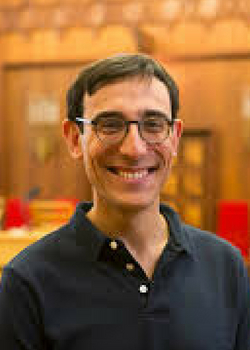As the admissions point person for the Ziegler School of Rabbinic Studies, I am often asked by our perspective students, "What makes the Ziegler School special? How is it different from the other fine North American rabbinical schools?" After assuring these anxious rabbis-to-be that they can become scholars of Talmud and Torah wherever they choose to pursue their Rabbinic degree, and acknowledging that they will be able to acquire the practical skills of preachers and teachers elsewhere as well, I eventually share with these curious students what I think makes this institution unique. Since I arrived at Ziegler in August to join the school’s administration as an assistant dean, I have been astounded, time and again, by the genuine love and care that students, faculty and staff, show for one another. Ziegler is a place where doors are always open, where teachers and administrators are always available to listen to our student’s fears and concerns, and where they will be patiently met with a spirit of openness and warmth. Perhaps most importantly, this supportive atmosphere allows our students to figure out how to build community and connection so that they can recreate the warmth they have found here in the places they will end up serving as rabbis down the road.
Our Torah reading for this Shabbat, Parashat VaYera, opens with Abraham sitting at the opening of his tent, communing with God, as the sun blazes above at Midday. In the distance Abraham sees three men – whom we later learn to be angels – making their way through the desert. Abraham leaps to his feet and welcomes these strangers with a simple promise of bread and water, only to fete them with the finest food he can provide.
Going back to the ancient period, Jewish scholars have seen this narrative as theparadigmatic account for how we should greet those we encounter in our life’s journeys. But Jewish scholars have also been troubled by the role of God in this story, for the Torah reading opens with God appearing to Abraham, yet neither character is recorded as has having shared a word with the other before Abraham heads off to host his nomadic guests.
One early nineteenth century teacher, Rabbi Moshe Sofer, offers a beautiful resolution to this difficulty. Abraham, he proposes, must have been forlorn on that blazing hot Middle Eastern day with no travelers to care for, unable to find an object for his nearly bottomless compassion. In this state of sorrow, according to Rabbi Sofer, Abraham was also unable to access the Blessed Holy One. It was only upon seeing the guests in the distance that God appeared to him. Only in a state of joy at being able to help another human being did Abraham find the presence of God. God, it seems, was in the visage of these ragged nomadic travelers, and in the love that Abraham showed for them.
Too often, I find myself sitting at a table with someone I love and care for, yet both of us spend our time staring at the tiny screen in our hands, instead of into each other’s eyes. While I am busy looking for connection and community far away, love, the presence of the divine, is sitting right in front of me. Rabbi Sofer asks us, "How can I find God?" and he answers, "In serving, and caring for, and loving God’s creatures in my orbit."
I feel so blessed to be a leader and teacher in a community that puts these values at the forefront, and that is helping train a new cadre of caring rabbis to transmit that central message of community and compassion to our greater Jewish world and beyond.
Shabbat shalom.

